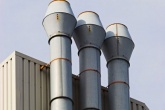Insufficient waste for new £240m Co. Antrim incinerator, report claims
A planned £240-million energy-from-waste (EfW) plant in County Antrim, Northern Ireland, will not have enough waste to feed it, according to a new report commissioned by campaigners.
The report, released last week (27 April) and compiled by specialist waste consultants Eunomia Research and Consulting, was commissioned by campaigners against the approved facility at Hightown Quarry in Mallusk, on the outskirts of Belfast. The headline claim against the facility, which has been developed by arc21, a waste management grouping of six Northern Irish councils, is that its capacity far outstrips the waste available to feed it, resulting in overcapacity.

The Hightown Quarry facility has attracted plenty of criticism since planning permission was granted last September, in the absence of a minister, by the permanent secretary of the Northern Irish Department for Infrastructure. NoArc21, the group leading the fight against the incinerator and crowdfunding a legal challenge to the granted planning permission, claims that increased recycling rates and the completion of other residual waste treatment facilities in the area – including the £107-million, 180,000-tonne annual capacity Full Circle Generation EfW plant close to opening in the Belfast Harbour estate – will greatly reduce the amount of available, treatable residual waste.
Eunomia’s report on the 120,000-tonne annual capacity Hightown Quarry facility found that there were 438,000 tonnes of waste per year available for treatment in Northern Ireland in 2016/17, falling to 116,000 tonnes in 2020/21 once facilities currently under construction become operational. For the arc21 region, there were 300,000 tonnes per year available for treatment in 2016/17, which would fall to 58,000 tonnes in 2020/21. It is suggested that an overcapacity would result in the planned facility lowering gate fees in order to attract more waste, weakening the incentives for collectors to pull out recyclable materials from the waste stream.
Developers, meanwhile, maintain that the facility is a viable project and will reduce waste to landfill by taking residual waste from the six arc21 councils, while also increasing recycling rates, providing jobs and boosting the local economy. A spokesperson for the group stated that issues pertaining to the levels of waste available to the facility had been addressed by an investigation by the Planning Appeals Commission (PAC), which initially recommended planning approval for the facility.
Speaking in the Irish News, Colin Buick, Chair of NoArc21, said: "This analysis, carried out by widely respected waste experts, clearly outlines that existing capacity as well as the construction of the Full Circle Generation facility at Airport Road West will meet the vast majority of the waste requirements of the arc21 region.
"Furthermore, it remains highly concerning to us that this facility appears to have made little to no progress in securing a grid connection, meaning that the incinerator will contribute nothing to security of electricity supply as has been claimed. We do not want to see this project turn into another botched energy scheme like RHI.”

In response, a spokesperson for arc21 said: “Arc21’s proposals to develop modern waste infrastructure will bring Northern Ireland into line with European best practice. The project has been one of the most scrutinised infrastructure proposals in Northern Ireland’s history, aligned with local and central government policy and statutory requirements, and assessed by professional planners in the planning authority (Department for Infrastructure) and the PAC.
“Following a hearing held in public, the PAC considered the evidence regarding all the issues including the issue of waste volumes to support arc21’s plans. It concluded that not only were the proposed facilities required, but that they would also provide economic and environmental benefits such as construction jobs, skilled jobs in operations and improved recycling.”
A burning question
The matter of residual waste treatment capacity has been a source of much debate over the past year. Back in August 2017, Eunomia released its twelfth Residual Waste Infrastructure Review, warning that the UK was heading for a residual waste treatment overcapacity by 2020/21 and that this excess capacity could reach 9.5 million tonnes by 2030/31.
The findings of this report were criticised by the Environmental Services Association (ESA), the trade association representing the waste management industry, with Executive Director Jacob Hayler calling Eunomia’s findings “flawed”. Hayler warned the government against “sleepwalking into a capacity crisis”, claiming that the UK is heading for an under-capacity of residual waste treatment.
This prompted a response from Eunomia that sought to reinforce its stance by releasing further figures backing up its original claims. Following this, waste management company SUEZ brought forward the release of its own report in opposition to Eunomia’s, finding that the UK is headed for a residual waste treatment capacity shortfall due to a shortage of EfW incineration plants and the reduction of landfill sites. A number of other waste management companies, including Biffa, also sought to highlight the risk of future under-capacity in their own individual reports.
A growing chorus of energy-from-waste critics has begun to emerge, with anti-incineration charity the UK Without Incineration Network (UKWIN) launching a ‘Bin the Burners’ campaign which calls for a moratorium on new waste incineration projects back in November.
Shlomo Dowen, National Coordinator of UKWIN, commented on the Hightown Quarry facility, saying: "The procurement process took place in era that was tied to the linear economy. The incineration plant has become out-of-date before construction has even begun. It is now time to drop the plans in favour of a new approach that is consistent with the move towards a more circular economy."
Meanwhile, Professor Ian Boyd, Chief Scientific Advisor at the Department for Environment, Food and Rural Affairs (Defra), has emphasised the need to move towards more sustainable forms of resource use while warning against further investment in EfW, saying that it “extinguishes the value” of resources and could harm innovation.











